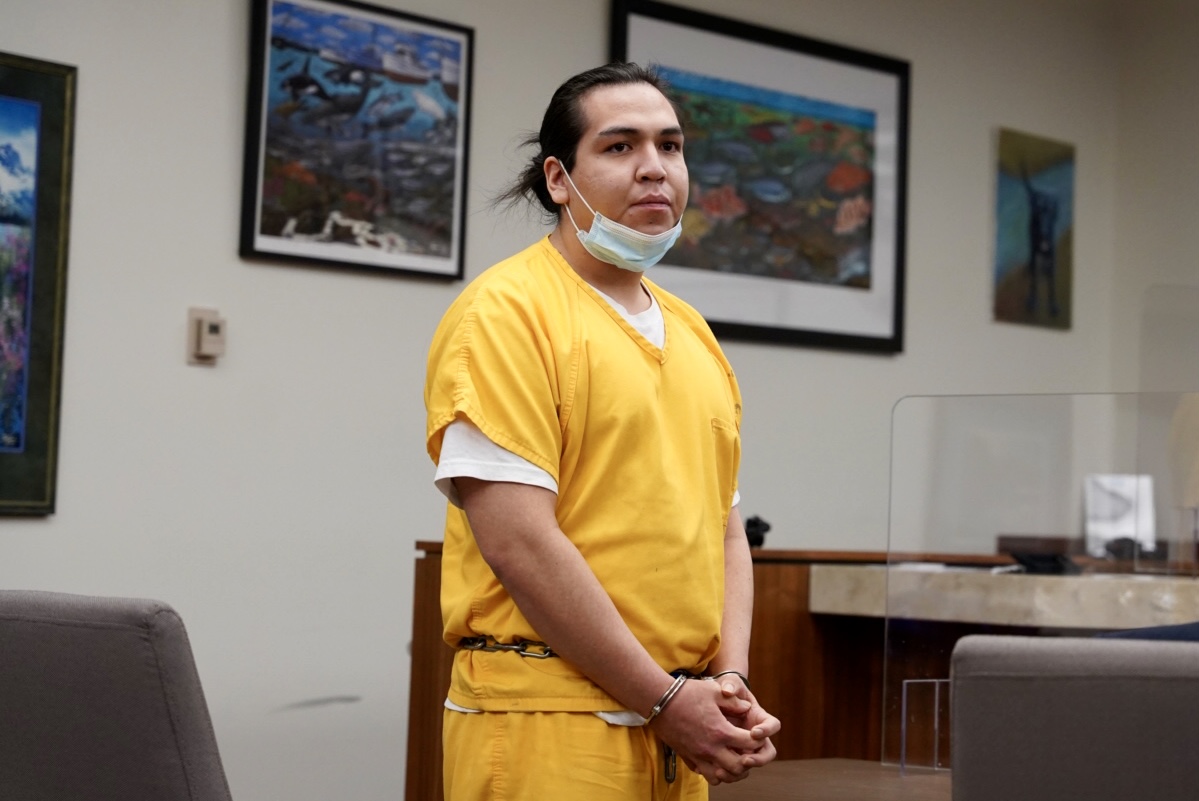
Tyler Cavanaugh speaks during a sentencing hearing in Ketchikan on Feb. 17, 2022. Cavanaugh was sentenced to 20 years in prison after he was convicted of second-degree murder in the death of his stepfather. (Eric Stone/KRBD)
A Ketchikan man convicted of second-degree murder over the 2020 death of his stepfather has been sentenced to 20 years behind bars.
All three gallery rows in Ketchikan courtroom 306 were packed. On one side were supporters of 24-year-old Tyler Cavanaugh. On the other were friends and family of his victim, Peter Jensen.
“This case is an enormous tragedy for two families,” Superior Court Judge William Carey said at a recent sentencing hearing. “The families know each other, all members of the same tribal entity, family, clan, in many ways. And one has been lost, and one is going away for a significant period of time, no matter how you look at it.”
Feb. 17’s hearing followed a trial in early January.
Cavanaugh was charged with second-degree murder in July 2020. That’s when police found his stepfather, Jensen, dead at their shared home after a fight.
Ketchikan District Attorney Kristian Pickrell argued at trial that Cavanaugh had attacked his stepfather in a drunken rage. He pointed to comments Cavanaugh made to police in an interrogation after the incident — that Jensen had treated his mom and him as servants as they cared for the 43-year-old man who had health problems stemming from excessive drinking.
“Tyler Cavanaugh believed that Peter Jensen was humiliating him and his mother, Holly Jensen. On July 17 of 2020, Tyler Cavanaugh decided he had endured enough humiliation. Tyler Cavanaugh retaliated for the humiliation by beating Peter Jensen to death with his fists and his feet,” Pickrell said at trial.
Washington state attorney David Vogel was retained for the defense. The judge allowed him to sketch a pattern of domestic abuse and alcoholism on the part of the victim that led up to his death.
“When Peter Jensen was not drunk, he could be a good man,” Vogel said during the trial. “But the problem is that more often than not, he was drunk. And if he didn’t have alcohol when he was getting drunk, if he ran out of alcohol, then he was at his worst.”
He also alleged that Jensen was physically abusive towards his wife. And he says Jensen helped cause his own death by reaching for a rifle during a struggle with his stepson.
“What happened to him wasn’t that he got killed in a fistfight. He got beaten up. He got beaten up badly,” Vogel said.
Jensen died of blunt force trauma, according to first responders.
And after two days of deliberation, a unanimous Ketchikan jury rejected the defense’s version of events. The 12-person jury convicted Cavanaugh on two counts of second-degree murder and one of manslaughter.
Then came this month’s sentencing. Vogel, Cavanaugh’s attorney, pointed to his mother’s history of abusive relationships and the effect it had on Cavanaugh as a child.
“Since the age of 11, he’s been his mother’s protector. And in being forced into that role, he has developed PTSD (post-traumatic stress disorder), which has been diagnosed by a psychologist,” Vogel said at Thursday’s hearing.
He said that history of trauma, among other things, should justify a sentence below the typical 20- to 30-year range for second-degree murder. He asked for a sentence of 15 years behind bars, the minimum for second-degree murder.
Pickrell, the prosecutor, argued that Cavanaugh’s childhood trauma should not factor in and argued for 40 years in prison.
“There are millions of people in the United States that have the same difficulty in their upbringing, and they don’t murder someone,” Pickrell said.
People close to the victim also spoke up at sentencing. Peter Jensen’s mother, Mary Jensen, shared memories of her son helping her around the house.
“Whenever there was anything to fix around the house, he would do it,” she said. “And he was just nice company.”
The victim’s father, David Jensen, said he missed his son.
“Every day, I think about Pete,” he said.
He asked for the maximum sentence of 99 years.
“If it was up to me, I would give him the maximum allowable and then, if he ever accepts responsibility, and takes steps toward redemption, then that should be taken into account at that time,” he said.
Cavanaugh also addressed the court. His handcuffs and leg restraints jangled as he spoke.
“I’d like to apologize to the Jensen family for the situation that we’ve had. It’s been very difficult for you guys, and I’ll never understand what you guys are going through,” he said. “And I’m sorry to my own family. I love you guys, and thank you for being here for me. And I’ll never not be sorry, every single day.”
The judge ultimately agreed to take into consideration Cavanaugh’s youth and his traumatic childhood. Judge Carey acknowledged the victim had his own shortcomings.
“That doesn’t diminish him as a human being, though, or the value of his life in any way. It may affect some circumstances of how this whole thing came up and how to explain it. But again, it doesn’t diminish his the value of his life in any way,” Carey said. “And young Mr. Cavanaugh here, the value of his life is not diminished, either. But he has taken a life here.”
Carey imposed a sentence near the lower rung of the typical range: 30 years, with 10 suspended — so, 20 years behind bars — with 10 years of probation.





